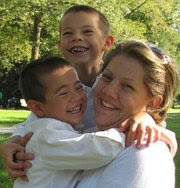While it is a common assumption that little boys will only enjoy reading twaddle such as Captain Underpants, this is far from the reality!
It has been our experience that when children are provided with quality literature from the beginning and are not exposed to the twaddle, they will be drawn in by worthwhile content. They will appreciate good writing. Their minds will be stimulated, they will learn, grow and their worldview will be shaped - in part- by what they read.
Paul states, in his letter to the Philippians the following:
"Finally, brothers, whatever is true, whatever is honorable, whatever is just, whatever is pure, whatever is lovely, whatever is commendable, if there is any excellence, if there is anything worthy of praise, think about these things." Philippians 4:8If we are to think on such things, shouldn't the material we read reflect the same? Should we not, as parents, put great effort into selecting the most God-honoring content for our children to read?
I know. The argument is that if we don't let them read it they'll want to read it more! I say, "not true"! It's that simple. When children understand why they should not read something, they are likely to join with you in searching for quality reading material. The young adult market is inundated with paranormal fiction, dungeons and dragons, and even erotica! Is it acceptable to allow them to read such material simply because it's what is readily available?
Practically, how does a parent monitor everything a child reads? How do you provide constant appropriate reading material? In a word- intention. It takes, like most everything else, time, effort and consistency. We do this in several ways.
Some books Dan prereads before we offer them to our boys. (Dan is a far better and faster reader than myself). This is fairly rare, however. We live in an age with the world at our fingertips! The internet is filled with Christian reviews of all sorts of books. When necessary, we read all the reviews we can to help us in making a decision about a particular book.
We use booklists from trusted sources. One such source is our homeschool curriculum, My Father's World, which provides a list of living books that coincide with each unit of study. Another list is is from Ambleside Online, a free online homeschool curriculum. We sometimes us the Sonlight book lists also.
A book we enjoy greatly is Honey for a Child's Heart by Gladys Hunt. This book provides excellent recommendations, with the exception of one. The newest version includes Harry Potter, regretfully. We do not recommend the Harry Potter series for children, regardless of their reading ability. This book is about the value of reading and is filled with book lists of all sorts.

Even with these resources, you may find that the recommended books are not easy to come by. Again, technology proves not all bad. Inter Library Loan (ILL) systems allow you to log into your library account online and reserve books from numerous libraries. If that fails, a visit to the reference librarian should find you what you need as they can request books from all over the country! After reading through the lists numerous times you begin to memorize them. You can often find some of these great books at yard sales and library book sales.
In fact, just yesterday at our continuous library book sale, I found Rascal (PMC) (Puffin Modern Classics)
You may also note that most of the books of high quality are older works. This is also true! Look at the best seller lists and compare. What is new and popular is NOT typically that which is Godly or God-honoring!
Admittedly, it does take great time and effort to find great quality reading material for kids and adults alike. That said, it can be such a fun adventure to find good books, and great discussions can be had about what is appropriate reading material given God's standards, and what is not.
The other argument often heard is that it's best to let children read what they choose or what is given to them at school, even if these books contain inappropriate content, and then discuss with them what they read. That sounds good, and is a great solution for those times when something slips by, but it assumes that the parent has full knowledge of the book to be able to discuss it thoroughly. It also discounts Philippians 4:16 in that knowingly giving a child material that promotes sinfulness in some way is to greatly risk leading them to sin. Daily life in our fallen world leaves plentiful opportunity to discuss the beliefs, views and ideas of others unlike ourselves. We need not feed it to our children intentionally.
Consider this:
"...but whoever causes one of these little ones who believe in me to sin, it would be better for him to have a great millstone fastened around his neck and to be drowned in the depth of the sea." Matthew 18:6









No comments:
Post a Comment